wHAT GOES WHERE?
We provide residential and commercial organics, recycling, and garbage collection in the City of American Canyon. Whether you are a business owner, property manager, or resident, we work with you to tailor recycling programs based on your needs. Find out how to properly dispose of your items below. Customers may also drop off recyclables, hazardous waste, and bulky items at the Recology Vallejo-American Canyon Recycling Facility.
Wondering what stream your waste goes in? Visit What Bin and find out!
Need to change the size of any of your carts, or order a new kitchen compost pail? Contact us.
-
ORGANICS
-
RECYCLE
-
LANDFILL
-
NO BIN
All compostable plastics, including BPI Certified Compostable Plastics, and bioplastics, will not be accepted.
| Acceptable Organic Materials |
|
Unacceptable Organic Materials |
Food Scraps: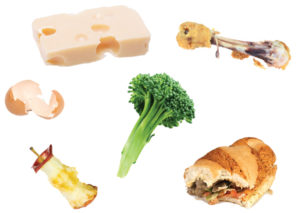
- Fruits and vegetables (including pits and shells)
- Coffee grounds and tea leaves
- Dairy products (no liquids)
- Eggs
- Leftovers and spoiled food
- Meat (including bones)
- Seafood (including shellfish)
Dirty, Soiled Paper: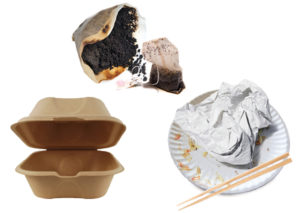
- Water/cooking oil soiled paper
- Greasy pizza boxes
- Paper coffee filters and tea bags
- Paper napkins, tissues, paper towels
- Unlined paper cups, plates, bowls, take-out containers
|
Plants:
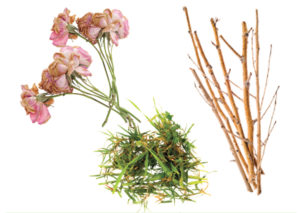
- Plant debris, including flowers, leaves, weeds, branches
- Tree trimmings (less than 6” in diameter and 4’ long)
Other:
- Cooking oil: Small amounts can be soaked up with a paper towel and composted.
- Corks (no plastic)
- Cotton balls, cotton swabs with paper stems
- Hair, fur, feathers (non-synthetic/colored)
- Untreated Wood: small pieces of clean wood/sawdust (Wooden chopsticks, coffee stirrers, toothpicks)
- Vegetable wood crates (metal wire OK)
|
|
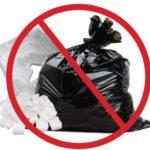 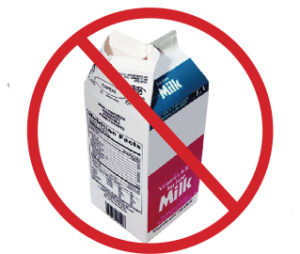
Recyclable Materials:
- Metal, paper (clean and dry), glass, plastic (large and rigid)
Landfill Materials:
- “Biodegradable/Compostable” plastic
- Cat litter or animal feces
- Corks (plastic)
- Diapers and Feminine Hygiene Products
- Flimsy plastic (plastic bags, wrappers, film)
- Foil-lined soup cartons and juice boxes
- Plastic-lined paper (hot beverage cups, plates, take-out containers)
- Waxed cardboard, milk, juice, beverage cartons
No Bin Materials:
-
- Cooking/motor oil
- Dirt, rocks, or stone
- Liquids or ice
- Treated Wood – plywood, pressboard, painted stained wood
|
|
Recycling must be loose, and free of a plastic bag liner. Recycling must be clean and dry. Give food and beverage containers a light rinse.
| Acceptable Recycling Materials |
|
Unacceptable Recycling Materials |
|
Metal:
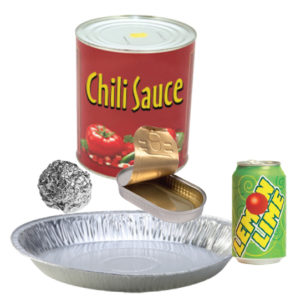
- Aerosol spray cans (must be empty)
- Aluminum cans
- Aluminum foil and trays (ball foil up to softball size)
- Caps and lids from bottles, jars, steel (tin) cans
- Paint cans (must be empty)
- Steel (tin) cans
Plastics (large and rigid):
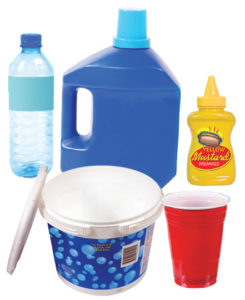
- Bottles (leave caps on)
- Buckets (metal handle ok)
- Clamshell plastic packaging
- Containers
- Laundry detergent bottles
- Toys (no electronics, metal, batteries)
- Tubs and lids (yogurt containers and Tupperware)
- Single-use plastic cups (cold beverage cups)
|
Paper (clean and dry):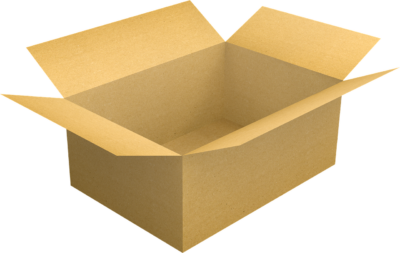
- Cardboard
- Cereal boxes and Paperboard (remove plastic liner)
- Computer and office paper
- Egg cartons
- Envelopes (windows okay)
- Junk mail and magazines
- Newspaper
- Paper bags
- Sticky notes
- Shredded paper (place in sealed paper bag and label “Shredded Paper”)
Glass:
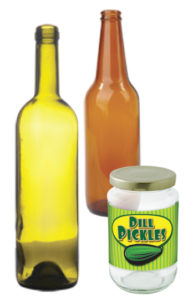
- Glass bottles and jars only
(metal caps and lids too)
|
|
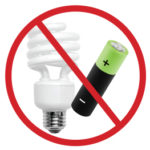 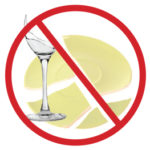 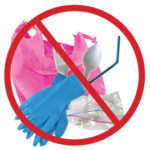
Organic Materials:
- Food scraps, plants, soiled paper
Landfill Materials:
- “Biodegradable/Compostable” plastic
- Ceramic dishware, glass, mirrors
- Clothing/Fabric ( we suggest donating to a shelter or thrift store)
- Coat hangers
- Diapers and Feminine Hygiene Products
- Flimsy plastic (plastic bags, wrappers, film)
- Foil-lined soup cartons and juice boxes
- Plastic items mixed with metal, fabric, or rubber
- Plastic-lined paper (hot beverage cups, plates, take-out containers)
- Small plastic (single use cutlery, straws, coffee pods, sauce containers)
- Styrofoam
- Waxed cardboard, milk, juice, beverage cartons
No Bin Materials:
- Batteries
- Bulky items (appliances, furniture, metal, plastic, wood)
- Cooking oil/motor oil
- Electronics
- Household hazardous waste or chemicals
- Light Bulbs
- Liquids or ice
- Needles or syringes
- Paint
- Scrap metal
- Toys with electronics or batteries
- Treated Wood – plywood, pressboard, painted stained wood
|
Only place materials that cannot be reused, recycled, or composted in your trash.
| Acceptable Landfill Items |
|
Unacceptable Landfill Materials |
- “Biodegradable/Compostable” plastic
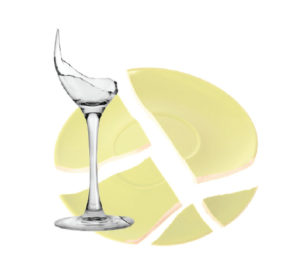
- Ceramic dishware, glass, mirrors
- Cat litter and animal feces (bagged)
- Cigarette Butts (extinguished – run underwater prior to disposal)
- Coat hangers
- Diapers and Feminine Hygiene Products
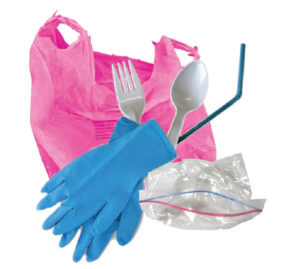
- Flimsy plastic (plastic bags, wrappers, film)
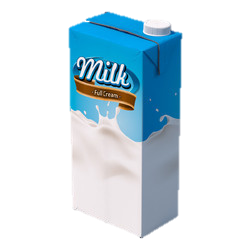
- Foil-lined soup cartons and juice boxes
|
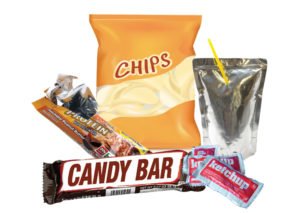 Mylar (shiny metal) bags (potato chips, candy bars, balloons) Mylar (shiny metal) bags (potato chips, candy bars, balloons)- Pens and pencils
- Plastic items mixed with metal, fabric, or rubber
- Plastic-lined paper (hot beverage cups, plates, take-out containers)
- Six-pack ring holder – please cut up
- Small plastic (single use cutlery, straws, coffee pods, sauce containers)
- Styrofoam
- Waxed cardboard, milk, juice, beverage cartons
|
|
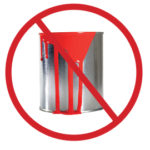 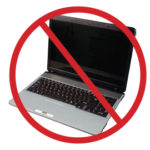 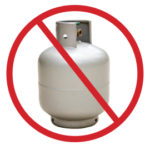
Organic Materials:
- Food scraps, plants, soiled paper
Recyclable Materials:
- Metal, paper (clean and dry), glass, plastic (large and rigid)
No Bin Materials:
- Asbestos
- Batteries
- Bulky items (appliances, furniture, metal, plastic, wood)
- Construction debris
- Cooking oil/motor oil
- Dirt, rocks, or stone
- Electronics
- Household hazardous waste or chemicals
- Light bulbs
- Liquids or ice
- Needles or syringes
- Paint
- Scrap metal
- Toys with electronics or batteries
- Treated Wood – plywood, pressboard, painted stained wood
|
It is illegal to put items such as electronics, batteries, fluorescent bulbs, pesticides, and other chemicals in the trash. When household hazardous wastes end up in a landfill, they can cause serious threats to humans, wildlife, and the environment.
Effective January 1, 2021, treated wood (any wood that has been treated with a chemical preservative to protect the wood against attacks from insects, microorganisms, or fungi) is considered hazardous waste per California State law. Recology is no longer able to haul treated wood waste.
Find out how to properly dispose of your hazardous, and electronic & universal items at our facility:
Go to these facilities to properly dispose of other types of household hazardous waste and quantities over our limit:


















